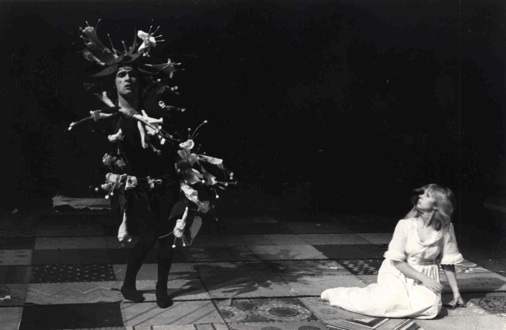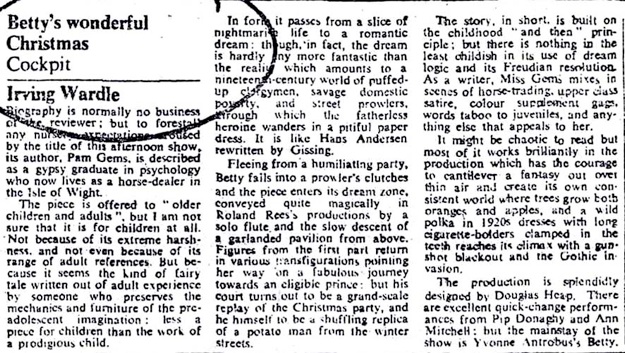Betty’s Wonderful Christmas





Cockpit Theatre, London (1972). Yvonne Antrobus.
Betty’s Wonderful Christmas was my first stage play. The setting is a small country town between the two World Wars, when living was still harsh for many people, the Salvation Army providing the only loving support for many in real distress.
But - children ran free, in safety. They knew the seasons, from broad beans to mistletoe, the names of trees, wild flowers, what was edible and what wasn't. They knew every bird that flew, every fish in the sea, in the river. They lived off land and sea - a shop-bought cake was a blot on the character (although tinned pineapple was conceded as exotic birthday fare). Men dug, sawed, hauled, mended shoes. Women washed, dried, aired, ironed, scrubbed, cooked, mended - and went out to work as servants to make enough to live on. Relationships were face to face, feuds and all, and no-one had a car or a telephone. Everyone walked, or rode a bike.
And everyone went to the theatre once a year. To the pantomime - which was utterly and stupendously wonderful. There was so much light - colour! Everything shone, sparkled. The Dame always had a mystifyingly deep voice and was funny. There were tricks and jokes and pies pushed rather worryingly into people's faces. The story always came out right, and the only boring moments were when everything stopped for a song. At our little church school we did plays too. I remember standing in the school playground watching tinsel-edged tarlatan wings being fixed to the fairies' backs, and the strong smell of the Leichner sticks - with a strange feeling of familiarity, of coming home.
So, writing a play for children seemed the way to begin. With a big cast, lots of adventures, music, jokes and scene changes. Ignorance is bliss.
But I was fortunate. The young David Aukin, as his first producing venture, was mounting a repertory of plays at the Cockpit Theatre over Christmas, and needed a show for the matinees. The fair, fragile Yvonne Antrobus played Betty and looked 14 (she was married and a mother). We had funky music from a trio who also played roles, and we played in the round - so close to the audience that the Dragon's four-year-old son ran onstage in protest when his father's tail was stamped on.
It was the best of entrées - a group of lively, irreverent actors, inventive, trained and talented, solving the problems of a beginner's text. The actress playing the Queen said one morning: `I hope you've got something else on the stocks, you're going to miss all this when we stop. Get your pen out.' It was good advice and I took it. To Ann Mitchell, my thanks.
Pam Gems
Review from The Times, January 6th 1972
